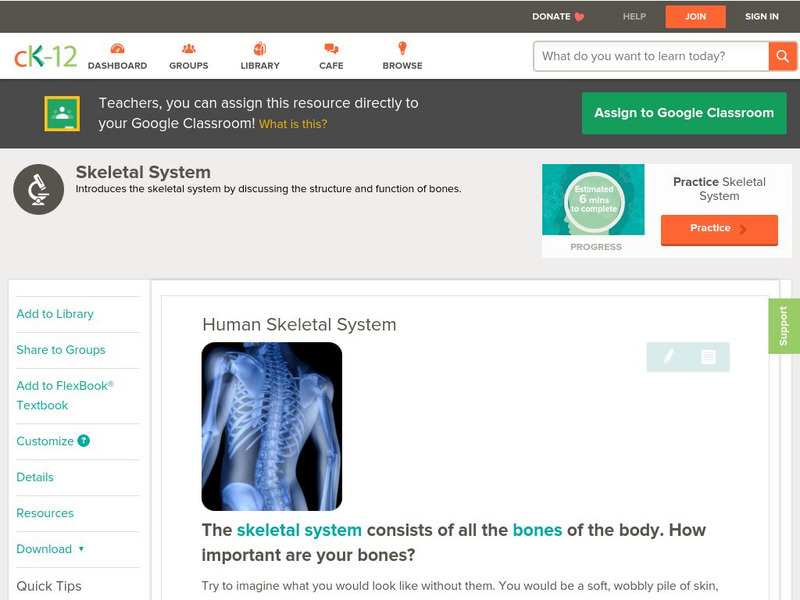Hi, what do you want to do?
Rice University
Biology for AP® Courses
An eight-unit electronic textbook provides a guide to AP® Biology. Each of the 28 chapters include an introduction, multiple lessons, a summary, review questions, and test prep questions. Teachers see how each lesson connects to a big...
Ask a Biologist
Human Skeleton Anatomy Activity
Young biologists piece together the puzzle of the human body with this simple anatomy worksheet. Presented with a picture of the human skeleton, students are challenged with the task of correctly identifying the 27...
NASA
Biology Training Conclusion
Gravity is just one consideration when determining human habitability on a new planet. The lesson connects four different units and starts with connecting the various systems: planetary systems, human body systems, etc. After scholars...
Curated OER
Respiratory System Crossword
Are you looking for a body systems crossword for the respiratory system portion of your unit? Here is one with 24 terms to fill in, mostly identifying structures of the respiratory system. You will find this appropriate for middle...
Serendip
Structure and Function of Cells, Organs and Organ Systems
Cells of different organs have unique cell functions. Learn how cell functions vary depending on their roles in the body using an inquiry-based activity. Scholars analyze the cell structure to make comparisons to its functions, allowing...
Compassion in World Farming Trust
Selective Breeding of Farm Animals
Biology learners read about selective breeding in chickens and how it has produced high-yield meat specimens and rapid egg-layers. The unpleasant effects of artificial selection are explored, as well as options to supporting this...
Gallantsbiocorner.com
Heart and Circulation
Young scientists get to the heart of the matter with this comprehensive review of the circulatory system. Addressing the different anatomical structures and processes involved in pumping blood through the human body, this worksheet...
Serendip
How Do Biological Organisms Use Energy?
When an organism eats, how does food become energy? Young biologists follow glucose through the process of cellular respiration to the creation of ADP using a discussion-based activity. The resource also highlights conservation of mass...
Casimir Middle School
Biological Classification Worksheet
Classify living things with a set of worksheets that has pupils sorting and indentifying living and non-living things. Learners use the worksheets as a basis for finding their answers.
Biology Junction
Introduction to the Plant Kingdom
Plants provide humans with food, shelter, and medications. Scholars gain a better appreciation for plants after learning their functions, divisions, and early ancestors. Each sub-topic includes slides highlighting vocabulary and...
Biology Junction
What Is Ecology?
Do you know the name for the biological study of interactions? A short presentation with accompanying worksheet introduces individuals to ecology. The materials offer a broad overview of the subject and the levels of organization to...
Biology Junction
ADP, ATP, and Cellular Respiration
Hans Krebs won the Nobel Prize for his discovery of what scientists now know as the Krebs cycle. Named after him, the Krebs cycle exists as only one system of the larger set, working together to keep human bodies functioning. The...
Biology Junction
Plant Structure and Function: Roots, Stems, and Leaves
Scientists found fossils of plants more than 420 million years old—but plants existed for up to 100 million years prior to these fossils. Learn about the importance of plants to the entire planet. Viewing a presentation helps scholars...
Kenan Fellows
Making Connections with Water Quality
What's in your water? And, why is water quality so important? Enhance your class's level of water appreciation through a lesson that demonstrates the necessity of water quality. Environmental enthusiasts explore the EPA's Clean Water...
Howard Hughes Medical Institute
Modeling Trophic Cascades
In the ecological game of who eats who, one small change can have a big impact! Individuals create food chains in an array of ecosystems, then determine what happens to organisms in the chain when one organism changes its feeding...
Biology Junction
Flatworms
In this flatworms instructional activity, high schoolers identify and color the different parts of a flatworm. They complete 14 short answer questions related to the topic.
Earth Day Network
The Neolithic Revolution
With the abundance of food products we can easily access in our society today, it is easy to forget the toll this can take on our global environment. Young learners will discover how the transition to agriculture and domesticated living...
CK-12 Foundation
Ck 12: Biology: Human Skeletal System
[Free Registration/Login may be required to access all resource tools.] Introduces the skeletal system by discussing the structure and function of bones.
CK-12 Foundation
Ck 12: Episd: Organization of the Human Body
[Free Registration/Login may be required to access all resource tools.] From basic cells to tissue to organ systems, identify and understand the structures and functions of the human body's organization.
CK-12 Foundation
Ck 12: Biology: Organization of the Human Body
[Free Registration/Login may be required to access all resource tools.] Introduces cells, tissues, organs, and organ systems in the human body.
CK-12 Foundation
Ck 12: Life Science: Organization of the Human Body
[Free Registration/Login may be required to access all resource tools.] Cells, like these nerve cells, do not work in isolation. To send orders from your brain to your legs, for example, signals pass through many nerve cells. These cells...
Texas Education Agency
Texas Gateway: Biological Systems: Homeostasis
Study the process of by which humans respond to their environment to reach equilibrium in this tutorial. Learn that feedback mechanisms trigger living things to respond to their environment.
CK-12 Foundation
Ck 12: Life Science: Respiratory System Organs
[Free Registration/Login may be required to access all resource tools.] When you think of the processes of breathing, the lungs probably come to mind. The lungs are the main organ of the respiratory system. However, many other organs are...
Khan Academy
Khan Academy: Human Body Systems: Unit Test
Take this nine-question unit test over the human body systems.




























